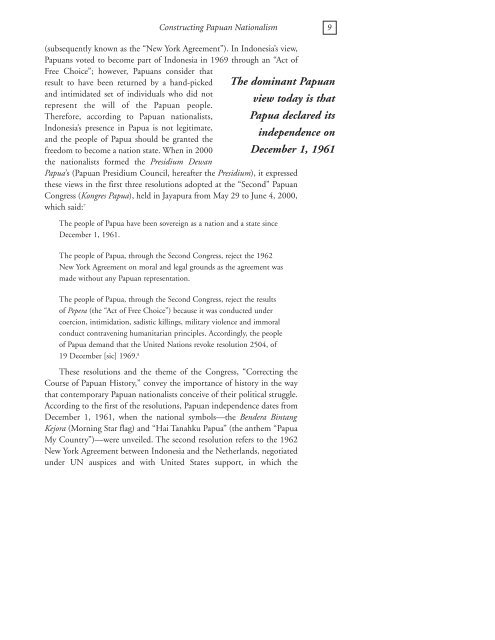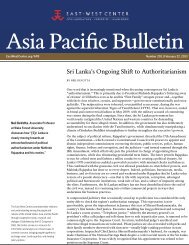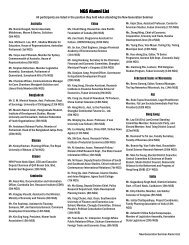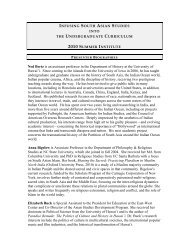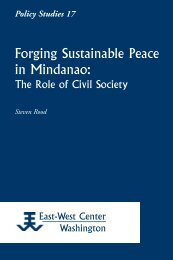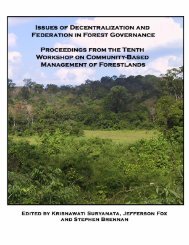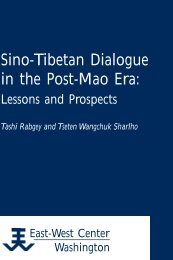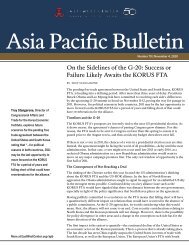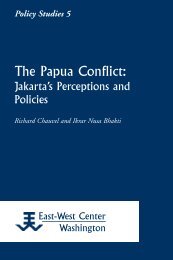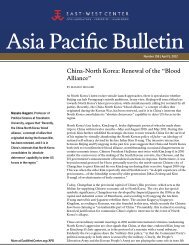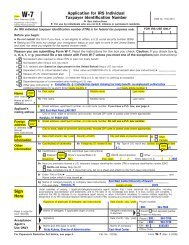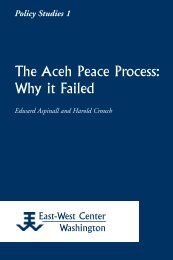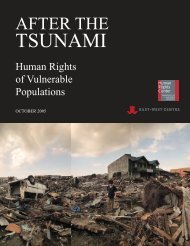Constructing Papuan Nationalism: History, Ethnicity ... - ScholarSpace
Constructing Papuan Nationalism: History, Ethnicity ... - ScholarSpace
Constructing Papuan Nationalism: History, Ethnicity ... - ScholarSpace
- No tags were found...
You also want an ePaper? Increase the reach of your titles
YUMPU automatically turns print PDFs into web optimized ePapers that Google loves.
<strong>Constructing</strong> <strong>Papuan</strong> <strong>Nationalism</strong> 9(subsequently known as the “New York Agreement”). In Indonesia’s view,<strong>Papuan</strong>s voted to become part of Indonesia in 1969 through an “Act ofFree Choice”; however, <strong>Papuan</strong>s consider thatresult to have been returned by a hand-pickedand intimidated set of individuals who did notrepresent the will of the <strong>Papuan</strong> people.Therefore, according to <strong>Papuan</strong> nationalists,Indonesia’s presence in Papua is not legitimate,and the people of Papua should be granted thefreedom to become a nation state. When in 2000the nationalists formed the Presidium DewanPapua’s (<strong>Papuan</strong> Presidium Council, hereafter the Presidium), it expressedthese views in the first three resolutions adopted at the “Second” <strong>Papuan</strong>Congress (Kongres Papua), held in Jayapura from May 29 to June 4, 2000,which said: 7The people of Papua have been sovereign as a nation and a state sinceDecember 1, 1961.The dominant <strong>Papuan</strong>view today is thatPapua declared itsindependence onDecember 1, 1961The people of Papua, through the Second Congress, reject the 1962New York Agreement on moral and legal grounds as the agreement wasmade without any <strong>Papuan</strong> representation.The people of Papua, through the Second Congress, reject the resultsof Pepera (the “Act of Free Choice”) because it was conducted undercoercion, intimidation, sadistic killings, military violence and immoralconduct contravening humanitarian principles. Accordingly, the peopleof Papua demand that the United Nations revoke resolution 2504, of19 December [sic] 1969. 8These resolutions and the theme of the Congress, “Correcting theCourse of <strong>Papuan</strong> <strong>History</strong>,” convey the importance of history in the waythat contemporary <strong>Papuan</strong> nationalists conceive of their political struggle.According to the first of the resolutions, <strong>Papuan</strong> independence dates fromDecember 1, 1961, when the national symbols—the Bendera BintangKejora (Morning Star flag) and “Hai Tanahku Papua” (the anthem “PapuaMy Country”)––were unveiled. The second resolution refers to the 1962New York Agreement between Indonesia and the Netherlands, negotiatedunder UN auspices and with United States support, in which the


